Elizabeth Hurley on Her Commitment to Breast Cancer Awareness: 'It's About the People I've Met' (Exclusive)
- Oops!Something went wrong.Please try again later.
- Oops!Something went wrong.Please try again later.
Hurley has been working with the Estée Lauder Companies' Breast Cancer Campaign for 28 years
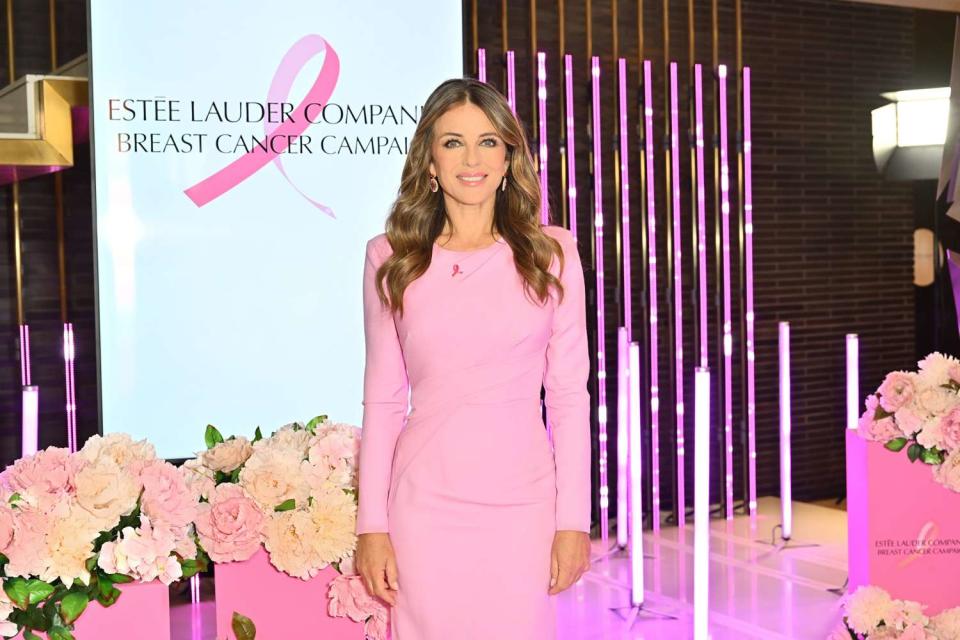
Dave Benett/Getty
Elizabeth Hurley at an event for Estée Lauder Companies Breast Cancer CampaignWhen it comes to speaking out on the importance of self-checks, getting mammograms and understanding breast cancer, Elizabeth Hurley is always ready to start the conversation.
The actress and global ambassador for the Estée Lauder Companies’ Breast Cancer Campaign has been working with the organization for nearly three decades to advocate for women's health and help educate people everywhere about breast cancer — because she knows firsthand how many lives are touched by the disease.
As part of this year's campaign, called Beautifully United to Help End Breast Cancer, Hurley has continued to share news about the latest advancements in breast cancer research, as well as connect with people all over the world about their own health journeys.
Ahead, Hurley speaks with PEOPLE about all the emotions Breast Cancer Awareness month brings, her latest work with the Campaign, "bullying" her friends and family to be diligent about self-checks and more.
Related: Elizabeth Hurley Recounts Conversation with Cancer Researcher Who Discovered Her Breast Cancer
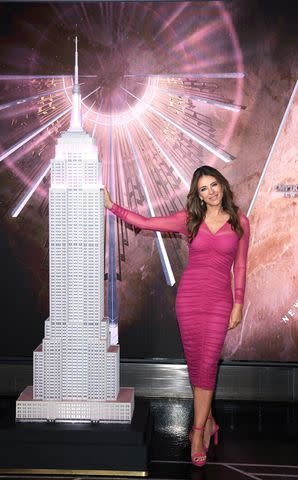
Dimitrios Kambouris/Getty
Elizabeth Hurley at Empire State BuildingWhat makes this year unique or special for the Estée Lauder Companies and the Breast Cancer Campaign?
This is my 28th year of raising funds and awareness for the Breast Cancer Campaign. Every year ends up feeling so special because it's all about the people I've met. Every year more women speak to me and tell me they've been diagnosed, or people will speak to me — they could be male or female — and say they've lost their mother or their wife or their sister. And I hear it a lot, which just makes each year special. We have always good news about treatments and medical progress. We hear about new educational programs we're doing. All these things are great, but still what moves me the most is when I hear someone's story.
Speaking of education and treatments, is there anything that has come up in the last year or so that has captivated your focus?
I think we've gradually been learning more and more how breast cancer, which is actually many different cancers, is different and can behave very differently in the body. I've learned how treatments now are so much more targeted than they were 28 years ago when I started, where scientists knew so much less about the individual types of breast cancer.
What we've been learning more of recently is how different women and different groups of women can be affected by different types of breast cancer. And fairly recently in the last few years, I learned that, for example, is how breast cancer can disproportionately affect black women. That's something I didn't know previously.
The Estée Lauder Companies Charitable Fund is donating $15 million to tackle that diversity issue and to find out much more about why that in particular was happening. We've learned a lot more about that this year and we're going to continue to learn more.
Related: Elizabeth Hurley Shares How to Get Involved in Breast Cancer Awareness & Life Saving Research
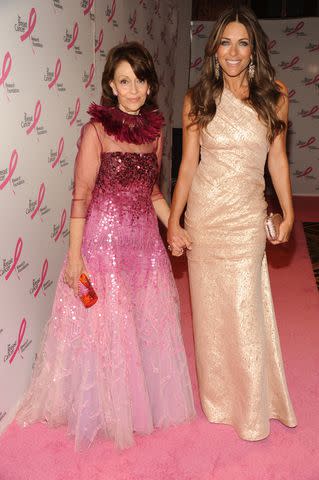
Fairchild Archive/Penske Media via Getty
Elizabeth Hurley and Evelyn Lauder at Hot Pink PartyYou've done so much in your 28 years, but what are you most proud of?
I think for me, when a woman tells me that she's seen me on television or in a magazine or on my Instagram talking about breast cancer, recommending that people go for a mammogram, recommending that people self-check, recommending that people familiarize themselves with their own breasts. When somebody comes up to me and says, "I saw you talking about that. I did what you said, and to my horror have found a lump myself," or something similar. When that happens, it's a very good feeling.
For example, during COVID, when we couldn't do any live events, I did quite a lot with the Breast Cancer Campaign on my Instagram. One in which I was urging women to self-check, and two of my friends saw my Instagram, checked themselves, and found lumps themselves that they wouldn't have found otherwise. It wouldn't have been found until their next mammogram if they'd even had one because they were quite young. So the fact that those women went to their doctor, got diagnosed, got treated, and as it happens, both found it very early.
That really means a lot. and I do feel quite pleased in those moments that the message reached where it was meant to reach.
A big part of the Campaign is educating people on self-checks and women's health. What do the conversations look like that you have at home with family and friends?
I'm very much known as the breast cancer bully amongst my friends. I mean, for 28 years I've been bullying my family members and my friend group to self-check and to get their regular screenings and to go to the doctor quickly if there's something wrong, because my own family history is that my grandmother in the early '90s found a lump, didn't tell anyone for a long time, finally told a doctor, was embarrassed, was ashamed, didn't want to speak about it. Therefore, we didn't know anything about her treatments. We didn't know anything. She died. She had a mastectomy, but she died and we just didn't know anything. So I would just feel terrible if history repeated itself, if I have a chance of changing it, even if it is within a small circle — and hopefully it's within a much larger circle because of the public work I do as well — but privately, I do bully people about going through screenings. I call them all the time.
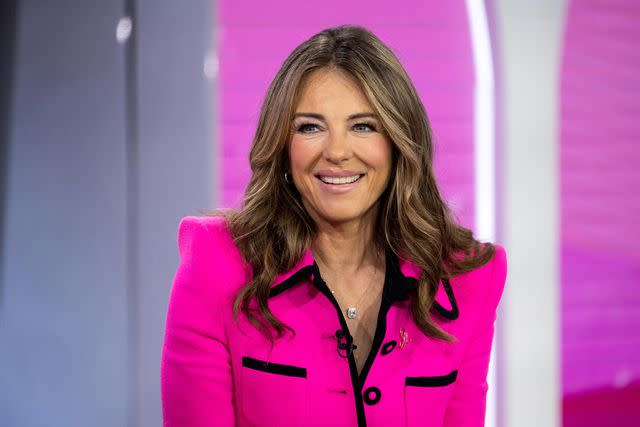
Nathan Congleton/NBC via Getty
Elizabeth Hurley appears on TODAYWhat is your advice for people who want to have more of these conversations in their own households?
Well, it's tricky. It's more difficult for some communities than others, and I understand that. There's a couple of girls that I work with in England, for example, who come from very different communities to me. One's from a Southeast Asian community and one's from an Afro-Caribbean community. They both reported that they've had breast cancer, that it's been very difficult to talk at home sometimes in front of male relatives. It's an added layer of challenge that they faced and they felt extremely lonely at the beginning because they didn't feel they really had freedom speech.
Before Evelyn Lauder co-invented the pink ribbon way back in the early '90s, we also didn't speak about it at home. Let's not forget — there was no pink ribbon. There was no Breast Cancer Awareness month. There were no big fundraising activities. We wouldn't have been having this conversation. It's changed, but other people, they still need to find the way to change as well. The two girls I've talked to have both formed support groups within their communities. They're trying to open the conversation. They're trying very hard. It'll take time like it took time here.
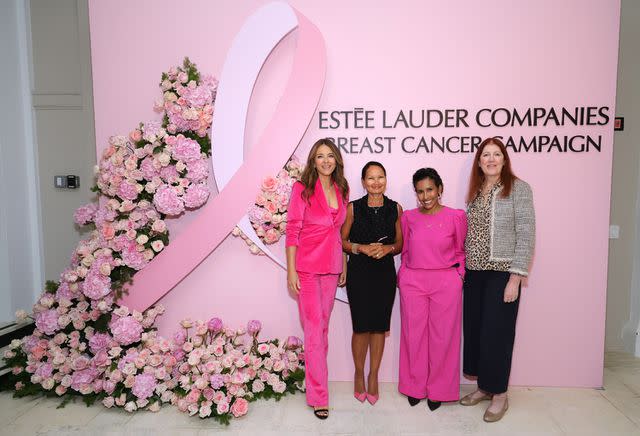
Kevin Mazur/Getty
Elizabeth Hurley, Dr. Lisa A. Newman, Sadia H. Zapp and Dr. Dorraya El-Ashry for Estée Lauder Companies Breast Cancer Campaign eventOctober is an emotional month for Breast Cancer Awareness — celebrating advancements and those who have beaten cancer but remembering those we've lost. How do you deal with all the emotions this month brings?
I can find it extremely upsetting sometimes. I don't think it's something you ever can just take in your stride. I mean, every story affects me quite badly, to be honest. I feel so incredibly saddened when somebody tells me they've lost a family member. And when you meet someone who's so brave who's battling the disease, it's incredibly moving as indeed it should be.
So it's a very emotional month for us too. I'm really aware. Yesterday we lit the Empire State Building pink, which is something we've done for years and years and years. I first it at pink in 2000 with Evelyn Lauder, and I know that there are so many women who can look up at that tower looking so radiantly beautiful pink glistening. I know how sad it's making so many feel, so many people feel, as well as giving them hope. So it is very much a bittersweet time whenever we get together to discuss issues, which are so painful for so many of us, it is bittersweet. But we do also take with us the message of hope and we give the progress reports, which are so different to the ones we were giving 28 years ago, that there is always good news to impart. But of course, some people have also had such bad news that it's bittersweet.
Never miss a story — sign up for PEOPLE's free daily newsletter to stay up to date on the best of what PEOPLE has to offer, from juicy celebrity news to compelling human interest stories.
What are you looking forward to in the year ahead?
I'm always looking forward to news from scientists. Research is so incredibly important to us. Of the $118 million that we've raised with our campaign, $93 million has gone straight to research. So for me, the news throughout the year that I'm looking for is always when they come and tell us about breakthroughs when we have more information. I love talking to the research scientists myself. Obviously, they have to dumb themselves down enormously to talk to me.
But when they do, and when I can understand what they're saying, and they can tell it to me in a way that I can pass it on to people, because I've obviously really noticed that when we talk to people, people can't deal with hearing something that they can't immediately understand. So whether it's translating or having someone help me translate medical news or corporate speak, whatever it needs to be, I've always felt very strongly it needs to be presented to people in a simplified but targeted way that we understand. So that's what I look forward to learning throughout the year.
For more People news, make sure to sign up for our newsletter!
Read the original article on People.

